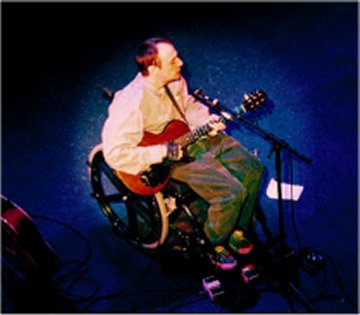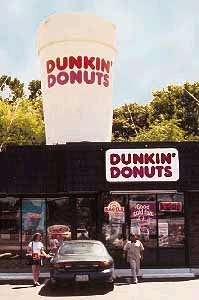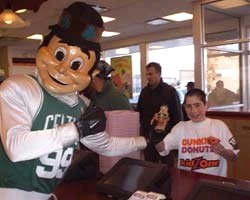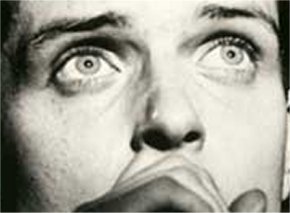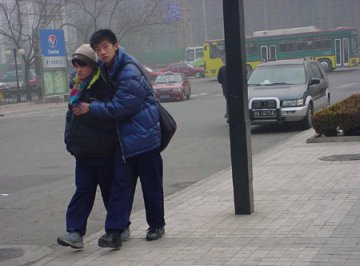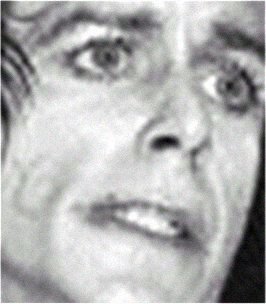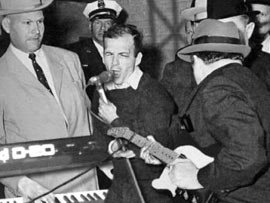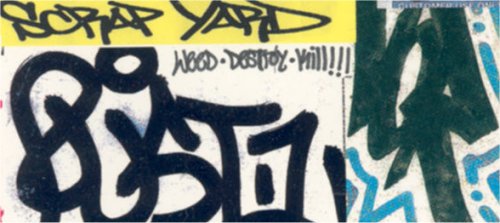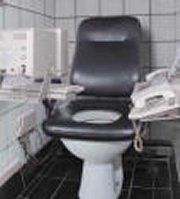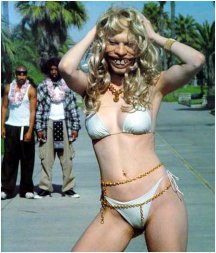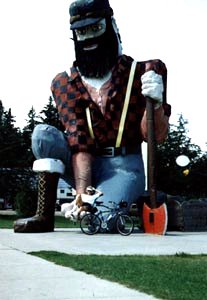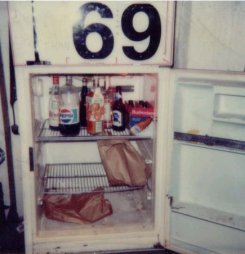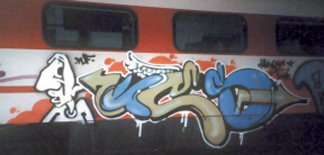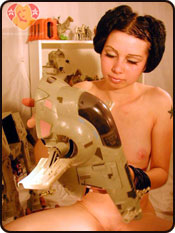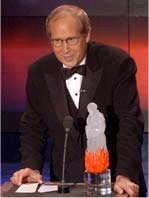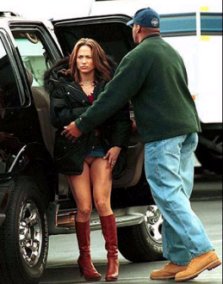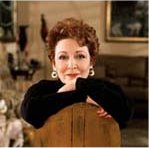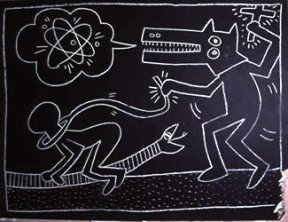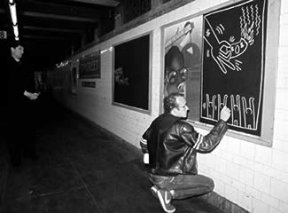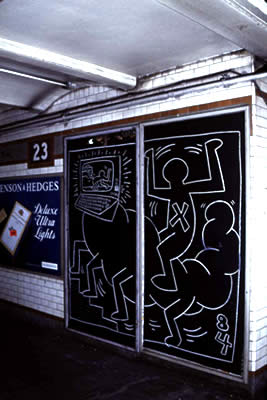
Last night I met up with Fitzcarraldo at Cafe Pick Me Up. I hadn't seen him in weeks. First we weren't getting along and then he went to Switzerland to visit his folks, ostensibly for Thanksgiving but really to help his dad out with his mom's impending panic attack. Some people get these and it's a couple of hours or a day of discomfort but for her it's a major event, occuring four or five times a year and precipitated by weeks of irrational behavior, night sweats and palpitations. When the full hysterical shebang hits, it's generally a scene worthy of the fire department. That happened a couple of times when they lived in Maryland. Now they live in Basel, Switzerland, where Fitz's father does cancer research for
Novartis, one of the biggest pharmaceutical companies in the world. When mom gets shaky, Fitz's dad calls him up and tells him to jump on a plane. I went along a couple of times. I remember one autumn night, going with Fitz to pick his dad up from work in the Saab that we weren't allowed to smoke in. The long rows of labs, plants and administrative buildings formed
a city within a city. The streets ran parallel to each other in straight lines, emptying out onto the avenue that we glided down upon. All at once men dressed in fall suit coats and carrying briefcases appeared, rushing out to the tram stops along the avenue with their heads down. The streetlights cast a blue, sinister glow over everything. One almost expected to see the Castle itself rising up over the Rheine, but that was in another country. The men walked alone, without any of the congeniality or lightheartedness that usually accompanies the end of a workday. They looked morose, beaten. These, I told myself, were soldiers on the frontline in the war against cancer. I don't remember seeing any women.
When Fitz's father slid into the passenger seat he said a brisk hello to me in the back without making eye contact, and proceeded to concentrate on his son's driving. He kept telling him to slow down, even though we were going below the speed limit. He also kept adjusting the electronic windows, not only on his side, but on Fitz's as well, in order to achieve the perfect "cross current."
Fitz's parents lived in a modern apartment building on a wide, tree-lined street. The rooms were square and white, with brand new tan parquet. Fitz showed me the bathroom in the master bedroom--bright yellow tiles and an equally yellow toilet with an octogonal shaped seat. Everything was very neat and quiet. Cars and trams had to shut off their engines when waiting at a light to reduce pollution. It was possible to receive a fine for excessive noise if one flushed one's toilet after 10pm. I felt conspicuous crunching through leaves on an empty street.
Even the graffiti was pristine--no dripping lines or sloppy overkill.

When I was there, Fitz's parents still hadn't unpacked all of the cardboard boxes they'd shipped from the States. They were discussing what to do with the various rooms. Novartis was ready to foot the bill for anything they might need. They provided them with the apartment, paid for the move and introduced Fitz's mother to the presidents of the Basel's American Ladies Club and the English Book Club, the members of which were all wives of men working for Novartis, many in the cancer research division. Fitz's mother was a stout, nervous woman who wore shapeless floral housedresses that were every bit the part of the suburban Maryland housewife, a role she seemed reluctant to relinquish, even though she claimed to be eager to learn Swiss-German and meet people from outside the ex-pat community. "Home", however, was still in the States, perhaps it always would be. I remember that she'd already received several large shipments from the U.S.--cardboard boxes to add to the cardboard boxes, filled with year supplies of Neutrogena shampoo and soap, Lean Cuisine frozen dinners and, curiously enough, Swiss Miss Hot Cocoa Mix.
Fitz is simultaneously embarassed and intrigued by what he sees as his parents' boring, middle-class lives. He views all their neurotic tendencies in light of their Kitschy surroundings, prodding them to reveal their tics and tendancies, analyzing them and then falling into one of his disconcerning silences, in which he seems to be recalibrating his own exaggerated pastiche of a personality.
Fitz's father has been prescribing himself the largest possible dosage of Prozac since '91, when it was still in clinical trials. Before that he was an alcoholic prone to holing himself up in the lab for weeks on end, working and drinking in a sanctuary from the outside world, where he felt it was his duty to go up to people in the mall and warn them about the possible malignent nature of the mole on their forehead or the blistery pimple on the edge or their nostril. The sight of people smoking threw him into fits. He often pulled the car over on the highway to race across the lanes and remove a rubber strip or a piece of metal that he felt was dangerous and might cause an accident.
Fitz's mother, on the other hand, wasn't on any meds as she claimed she couldn't swallow the pills. She didn't want to know about other options for ingestion. One night, Fitz and I got her tipsy on Swiss wheat beer and she got to gossiping about the ladies in her groups. She also complained about the incompetency of the director of the cancer research division after we saw him featured in a news clip on local TV. She went on and on until Fitz's father woke up from his daze and told her not to talk about things she had no idea about. His voice was quite stern and gave us all a start. He sloshed his gingerale around in his glass and shot it back like it was whiskey. It was the only time when I was there that we came close to talking about his work.
I slept on a guess bed in Fitz's room. His mother kept barging in--once to bring in a stack of folded sheets at 2 in the morning, another time to wake us up at 5 and ask if we'd be using the car that day. Why it mattered to her, I don't know, as she didn't drive. Apparently she was trying to catch us in the act. She knew we were gay but that didn't make a difference.
Ever since I met his parents, I tend to refer back to them in my mind when I see him. I walked into Cafe Pick Me Up and there were drumrolls in my head--I imagined a booming voice, trembling with Dolby cinematic thunder:"...Ladies and Gentlemen, from out of the shadows of suburban neuroses rises the Marxist dilletante, purveyor of dialectical materialism and fine French wines." There he was, a tall guy with a gut and bad posture, wearing
an expensive yet ill-fitting Dries Van Noten double breasted suit. I don't think he owns a pair of jeans. The brown leather attache case completed
the Lacanian analyst look that he was going for.
There's perpetual dandruff on his collar and his teeth are already turning black. He drinks all the time, but unlike TRUE, he never acts drunk--never loses control. If for no other reason, I like him because he can speak in an informed and eloquent manner about almost anything from his anti-humanistic stance. This is to say that very little of what human beings do or say makes an emotional impression on him.
We drank black coffee and talked about this and that--the news, books,
Henry Kissinger. There was no mention of his mother, or of TRUE--of the fact that she was still somewhere out west and hadn't made direct contact with either of us. All we had were her sporadic blog entries. There was also no mention of the fact that she and Fitz and fucked a couple of times just before she took off, which may or may not have made her a little loose in the screw.
When it comes down to it, Fitz is a really good listener. After a second cup of coffee and a brownie, I found myself spewing forth the dull facts of my current malaise. I realized it had been a while since I had someone to talk to. He sat heavily in his seat, arms folded--a Gauloise Blonde sticking out like an antenna from between the long fingers of his right hand.
I told him: "The only thing of any interest that I do is fuck. A completed act in mimicry of a perfect circle. I'm ashamed to say it but the girl hardly matters, in the end. They're all the same to me. Wham, bam thank you, Mam. Everything else in my life is unfinished. What do I have to show for myself besides the lousy paycheck that I get twice a month? Even that's transitory--here today and gone tomorrow. I can't even manage to save a single cent, although for the life of me I don't know what I spend it on. I can't even blame it on the bars, anymore. What have I done with my life? What have I produced? It seems possible that I made something of value, once, years ago, but maybe that's just the story that I tell myself. A story to keep the wolves at bay--a story to tell a girl while we're lying in bed: 'I used to make...one of them was even good enough to...' In the end it's come down to the fact that I've never found that special thing that I want to do--a noble pursuit, if you will--a valid process, the cataloguing of a new way of thinking.'
Fitz nodded and leaned his large frame over the table, staring down into his coffee. In person he's quiet and a little shy, something you wouldn't necessarily know from his blog entries. All that bullshit about him telling me that what I really want is a master. What I really want is to do something--something new, something revolutionary! I feel like I can't settle for less.
By way of a response, Fitz told me about a Godard movie. During a scene in a cafe, the audience listens to a conversation at a table while the camera focusses not on the people speaking, but directly down upon a cup of coffee, giving us a bird's eye view of the just stirred brown liquid. The camera moves closer as the people continue talking.
"Of course it's been done a million times in movies since," Fitz said in his most pedantic tone, "but as the converation goes on, full of banalities meant to reveal the impossibility for meaningful communication in today's world, there's actually a close-up of the *bubbles* in the coffee."
He picked up his cup, took a long sip and checked his look in the gilded mirror behind me.
